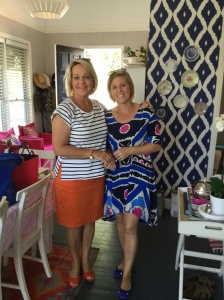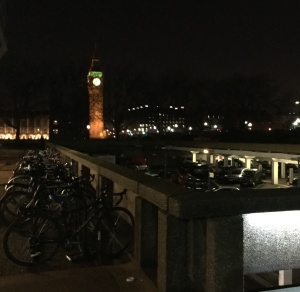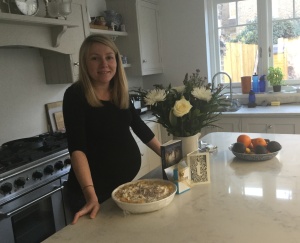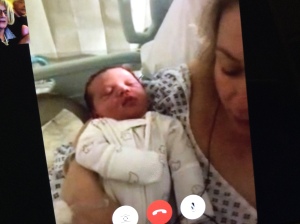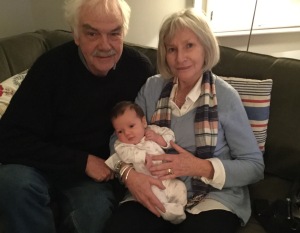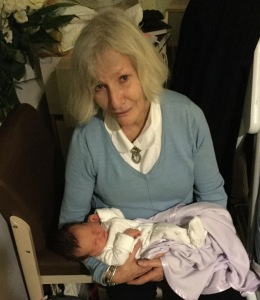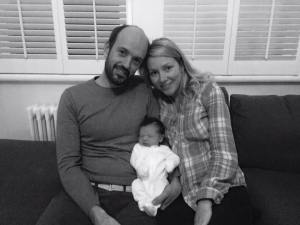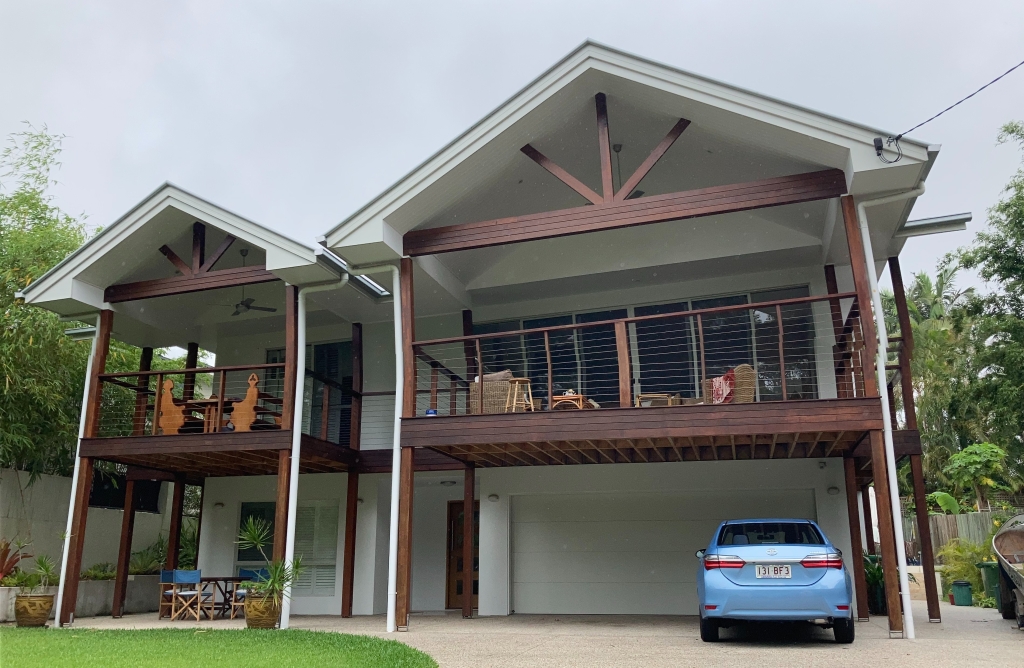
The browney – whitey house, (clue’s in the name, bestowed by granddaughter Matilda) is ready for her and sister Claudia to arrive for Christmas.** Brett and Beth the equal opportunity Bunning’s bears await, along with the shell collection, the family arrayed around the walls and even the old Yamaha organ set up by hopeful grandma. (Well, Mozart didn’t write his first symphony till he was nine!) They will have Kevin the koala and his tribe of well- worn dolls and soft toys for company, not to mention a shelf of books and a cupboard full of games and blocks and jigsaws.


We keep it all because we can’t be arsed cleaning it up, but also because they just love to rediscover things they have seen and played with before. Claudia is already setting up play dates with Kirsty Lorraine -Thea’s Cabbage Patch kid! Good to know that some things don’t change, and can be relied upon. As well, two doting (doddery) grandparents are a fixture – hopefully part of a childhood that is building emotional credit from which they will draw for the rest of their lives. But while that comes from being loved and cherished, we cannot discount physical familiarity; that some things will stay the same and give a feeling of permanence.
It’s the same feeling that has us return to places of childhood and stand in front of houses we’ve lived in, or the need to handle the stuff of our early lives, stroke the fur of a balding teddy, or leaf through a dilapidated picture book. It’s woven into who we are.
But what if you’re never allowed the luxury of permanence? What if you don’t happen to have the requisite thousands of dollars necessary to purchase some of that security for your family, no matter how much you try? What if you and your children live in insecure rental accommodation and are subject to the vicissitudes of the famous ‘market’ so prized by our system as a way of making the economy function. Finding affordable rent is becoming a joke – and a grim one at that. For thousands of Australian families, no matter how hard they work, the idea of a home they can afford to rent or buy in order to give them security and permanence is a distant dream. A friend of mine who volunteers for St Vinnie’s is trying to contact families to send them Christmas hampers, but finds that many of them have moved, or are not answering their phones. It’s a stark reminder that some people live with a level of precariousness that is truly frightening.*

Successive governments haven’t seemed to mind that house prices keep going up. By some calculations it makes the figures look good – private wealth for individual Australians is on the increase, and it’s one marker of a booming economy.
But surely there are other more important measures of a successful society. I’ve had many conversations about rising house prices, and the sense of achievement, that one’s dwelling is now worth so much more than when it was purchased. But this is bonkers accounting! Yes we might be sitting on a million dollars of real estate, but we have to live somewhere, and if we sell, we have to buy again in the same market, so we don’t actually have that money.
And if by virtue of your relative youth, a gig economy, and property speculation you are unable to get into the market, it becomes soul destroying. (Even more so when folk claim that you have frittered all your dosh on smashed avocado and latte.) Let’s see, that meal costs about $10, and the cheapest house in a city in Australia is $300,000. By my reckoning you’d have to eat 30,000 smashed avos to make up for a house – and that’s before you pay interest on a loan. It would only take you 82 years! And you’ll probably be sick of smashed avo by then.
When did shelter cease to be a human right, and become a way of making money? When did governments stop helping people to find affordable housing?
The health issues created by this uncertainty are unthinkable. Children growing up with a lack of permanent shelter amid the anxiety of parents trying to make ends meet are being robbed of a decent childhood. So many of those who end up moving from friends to family to living in their cars are ‘normal’ families who have been priced out of the market – ‘fallen through the cracks’, is the popular phrase. Isn’t it up to a decent society to mend those cracks?
Bill Clinton famously said, ‘It’s the economy, stupid.’ Allow me to rephrase that, Bill. ‘It’s the stupid economy!’ Even if you want to look at everything through an economic lens, the price we will all pay now and in the future, for the illness and stress that follows from insecure housing will cost a fortune! By one reckoning, a dollar spent to ameliorate the conditions for a child will save you twenty dollars spent trying to fix the unhappy adult. One way or another we will all pay for that! You can’t leave everything to the market – you have to intervene, but that takes a government with the courage to take the long view, not just the small window to the next election.
Check out the Attlee-led British government in the 1950’s that managed – in a war-damaged country that was stony broke – to build one million homes! (And, by the way, a free health system.) It can be done. It’s probably no coincidence that Attlee lived in a modest house in a suburb of London and was driven everywhere in a 1936 Hillman sedan by his wife Violet. No sign of the famed gold wallpaper refurbishment of Downing Street ordered by Boris Johnson, or the ninety (!) vehicles that accompanied Biden through Europe on his way to Glasgow. How did it come to this?
Amazon delivery is in overdrive, which tells us Christmas is approaching – and our thoughts turn to a small shelter in Bethlehem.
“Oh, that we, that we were there,
Oh that we were there!”
So goes the beautiful old carol, saying if only we had been present at the stable in Bethlehem we would have…we would have what? That stable is emblematic of a world we currently occupy – a couple on the road, seeking shelter – sounds a bit like refugees to me, or homeless people. And Mary and Joseph didn’t even have a car to sleep in – can’t sleep on a donkey!! Have we forgotten that their much-revered baby grew up to say things like:
‘Whatever you do to the least of my brethren, you do to me.” (Matt: 25: 40)
So now with contemporary stable – dwellers in full sight in a country supposedly renowned for its generosity and decency – governed by a man driven by his Christian beliefs, we find it more comforting to live in wistful regret that we weren’t there.
But we are.
(*I don’t want to disparage the many modest investors-turned-landlords who save for their retirement in this way. I just want to draw attention to a bigger systemic problem that needs some courage and vision.)
(** I’m aware that our house looks pretty posh! But that’s because we managed to buy that block of land in 1986! We boomers were such a lucky generation, due in large part to free health and education provided by a visionary government. Bob and I were the first in our families to buy a house. We are the embodiment of what a government can do for its citizens.)







 Yet they do. And they keep on doing. If there is a single lesson to take from this unholy mess, it is that – contrary to what all those dystopian Armageddon-y books and films would have us believe – society doesn’t break down. Dog doesn’t eat dog. People don’t take to their bunkers fending off all comers with firearms. Leather clad vigilante groups don’t stalk the streets. Instead, people with flimsy masks collect the shopping for their elderly neighbours, and children leave teddy bears out to cheer each other up.
Yet they do. And they keep on doing. If there is a single lesson to take from this unholy mess, it is that – contrary to what all those dystopian Armageddon-y books and films would have us believe – society doesn’t break down. Dog doesn’t eat dog. People don’t take to their bunkers fending off all comers with firearms. Leather clad vigilante groups don’t stalk the streets. Instead, people with flimsy masks collect the shopping for their elderly neighbours, and children leave teddy bears out to cheer each other up.






 That was Rome 2014, in a restaurant down a lovely little side street near the mad apartment that our old friends found through patient negotiation with…what was her name? The name is gone, but Rome comes flooding back. Before I know it I’m back in those gorgeous warm streets…with soft yellow and terra cotta crumbly-chic apartments, the flowers, the vistas waiting quietly, painter-ready for anyone with a brush and some talent.
That was Rome 2014, in a restaurant down a lovely little side street near the mad apartment that our old friends found through patient negotiation with…what was her name? The name is gone, but Rome comes flooding back. Before I know it I’m back in those gorgeous warm streets…with soft yellow and terra cotta crumbly-chic apartments, the flowers, the vistas waiting quietly, painter-ready for anyone with a brush and some talent.  The piazzas tumbling with life and food and folk with gorgeous scarves and shoes eating and laughing and strolling casually around one of Bernini’s magnificent sinewy arrangements of form and flora carved in white marble. My photos don’t capture it, but they bring the memory.
The piazzas tumbling with life and food and folk with gorgeous scarves and shoes eating and laughing and strolling casually around one of Bernini’s magnificent sinewy arrangements of form and flora carved in white marble. My photos don’t capture it, but they bring the memory. 
 everyone else has gone. And while they are ordering Margaritas at their poolside resorts, we are in a tiny office in Koh Samui Airport looking for our little luggage stickers. (You had them, no, you did!). We did eventually find the stickers, a taxi and even a Margarita. And to our surprise we also discovered there is an upside to a luggage-free life (well, couple of days).
everyone else has gone. And while they are ordering Margaritas at their poolside resorts, we are in a tiny office in Koh Samui Airport looking for our little luggage stickers. (You had them, no, you did!). We did eventually find the stickers, a taxi and even a Margarita. And to our surprise we also discovered there is an upside to a luggage-free life (well, couple of days).


 And as for that wardrobe! Let’s just say it’s big, and apparently built on that old adage, ‘if you build it they will come’. Because they did…in walked enough shoes to rival Imelda Marcos, and don’t start me on Hubs’ polo shirts (well you never know when you’ll need to change your shirt 37 times in one day). And that’s just the stuff that we didn’t deem worthy of flinging round the planet using all that precious energy so we could look good. Vanity, thy name is four pairs of jeans when you only need one! And yes, my bum looks big in all of them.
And as for that wardrobe! Let’s just say it’s big, and apparently built on that old adage, ‘if you build it they will come’. Because they did…in walked enough shoes to rival Imelda Marcos, and don’t start me on Hubs’ polo shirts (well you never know when you’ll need to change your shirt 37 times in one day). And that’s just the stuff that we didn’t deem worthy of flinging round the planet using all that precious energy so we could look good. Vanity, thy name is four pairs of jeans when you only need one! And yes, my bum looks big in all of them.
 which I would not choose. And let’s face it, I have choices, which most of the people in that street do not. One of our tour guides asked me how old I was, and told me I was very active for my age (!). I’ve been called a few things in my time, but active definitely isn’t one of them. He told me that a Vietnamese woman of my age would be broken down with hard work, and added that there would be little in the way of social services to look after her. All I am saying is that as a person with all those choices, I have chosen to accumulate lots of stuff, which needs housing, curating, fixing, and worrying over and one day chuffing off to Vinnies, where it will clutter up someone else’s life. And this is after reading any number of studies that tell us that it’s people, not things that make us happy.
which I would not choose. And let’s face it, I have choices, which most of the people in that street do not. One of our tour guides asked me how old I was, and told me I was very active for my age (!). I’ve been called a few things in my time, but active definitely isn’t one of them. He told me that a Vietnamese woman of my age would be broken down with hard work, and added that there would be little in the way of social services to look after her. All I am saying is that as a person with all those choices, I have chosen to accumulate lots of stuff, which needs housing, curating, fixing, and worrying over and one day chuffing off to Vinnies, where it will clutter up someone else’s life. And this is after reading any number of studies that tell us that it’s people, not things that make us happy. So here I sit in my ‘huge’ house looking out over a peaceful – but largely empty – street, feeling ridiculously wealthy and fortunate. Time for a rethink? Absolutely! But maybe after I’ve checked out the jeans on sale at that lovely little boutique on Hastings Street. (Just kidding…no, really!)
So here I sit in my ‘huge’ house looking out over a peaceful – but largely empty – street, feeling ridiculously wealthy and fortunate. Time for a rethink? Absolutely! But maybe after I’ve checked out the jeans on sale at that lovely little boutique on Hastings Street. (Just kidding…no, really!)










 isn’t going to help her get into Oxford. (Well you can’t start these things too early). And it’s messy. But somehow a pile of miniscule vests, a cereal- encrusted bib or a little coloured brick that gouges a chunk of skin from the unwary foot, are all so cute!
isn’t going to help her get into Oxford. (Well you can’t start these things too early). And it’s messy. But somehow a pile of miniscule vests, a cereal- encrusted bib or a little coloured brick that gouges a chunk of skin from the unwary foot, are all so cute! – the signature snack for our favourite dribbly person – trailed around the house with her particular pals, Pinkie the pink thing and Kevin the koala. And suddenly we find ourselves with a big Tildy-shaped hole in our lives that we long to fill with all that wonderful mess, tedium, vigilance and joy that a gorgeous little person creates effortlessly. I’ve always thought a clean house was overrated, now I know why.
– the signature snack for our favourite dribbly person – trailed around the house with her particular pals, Pinkie the pink thing and Kevin the koala. And suddenly we find ourselves with a big Tildy-shaped hole in our lives that we long to fill with all that wonderful mess, tedium, vigilance and joy that a gorgeous little person creates effortlessly. I’ve always thought a clean house was overrated, now I know why.
 through a world war, letting your kid hurtle down a slide the size of Nelson’s column, was the least of your worries. Nevertheless, I don’t remember feeling scared of my world, and I’m the person who invented risk aversion.
through a world war, letting your kid hurtle down a slide the size of Nelson’s column, was the least of your worries. Nevertheless, I don’t remember feeling scared of my world, and I’m the person who invented risk aversion. a month in Greece for twenty quid, and a house that we didn’t have to mortgage our souls for, is long gone. And was it really that golden? I remember pubs so smoky you couldn’t see who you were talking to (just as well really), having to go down the street to make a phone call, living in flats with no central heating, no fitted carpets and –
a month in Greece for twenty quid, and a house that we didn’t have to mortgage our souls for, is long gone. And was it really that golden? I remember pubs so smoky you couldn’t see who you were talking to (just as well really), having to go down the street to make a phone call, living in flats with no central heating, no fitted carpets and –  unimaginably – no IKEA furniture or Netflix! But there were reassuring, if dreary certainties: a job for life with a gold watch and a pension if you stuck it out, a religion that promised you a spot in heaven if you did all those Novenas, and the knowledge that tomorrow would be pretty much like today…just a bit duller.
unimaginably – no IKEA furniture or Netflix! But there were reassuring, if dreary certainties: a job for life with a gold watch and a pension if you stuck it out, a religion that promised you a spot in heaven if you did all those Novenas, and the knowledge that tomorrow would be pretty much like today…just a bit duller. And while there’s no way they want to go back even to the Nokia 3310, never mind the shared phone box in the street, what kind of world is our lovely little bub going to inherit?
And while there’s no way they want to go back even to the Nokia 3310, never mind the shared phone box in the street, what kind of world is our lovely little bub going to inherit? What I do have is the weight in my arms of a fragrant little person pointing with equal delight at the jeweled bright Queensland parrots, or the soft, dun coloured London
What I do have is the weight in my arms of a fragrant little person pointing with equal delight at the jeweled bright Queensland parrots, or the soft, dun coloured London  sparrows…she’s not fussy…everything is a complete delight to her. And together with trusty friends Pinkie and Kevin, her joy in the adventure of her life is what will inspire us all.
sparrows…she’s not fussy…everything is a complete delight to her. And together with trusty friends Pinkie and Kevin, her joy in the adventure of her life is what will inspire us all.